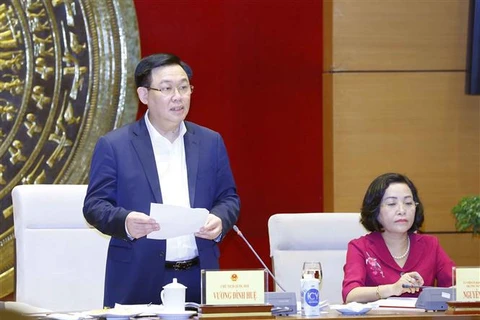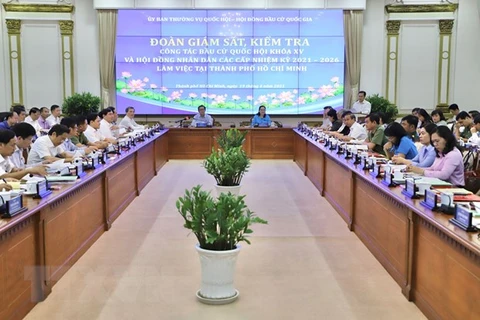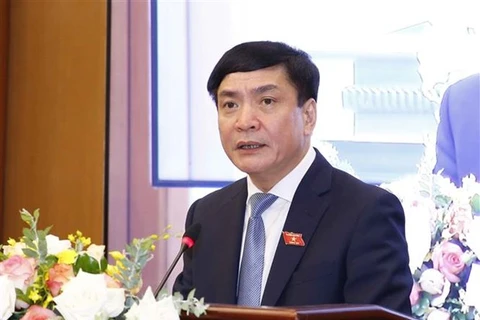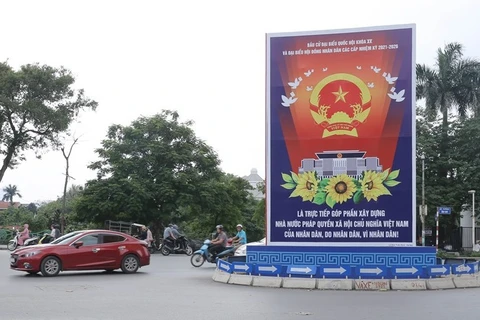Hanoi, (VLLF/VNA) - Election constitutes a fundamental, sacred and noble right of the people in the modern world today, reflecting the degree of state democracy, social consensus as well as political, legal and cultural identities of each nation.
On the occasion of the upcoming election of deputies to the 15th National Assembly and all-level People’s Councils, the 2021-26 tenure, let’s take an overall look at Vietnam’s current election law, Nguyen Mai Thuyen, Master of Laws from Hanoi Law University, wrote in a recent article.
In modern society, election holds an extremely important position of great political significance. Election is the method for forming modern state apparatuses in which the people select and mandate powers to those they elect. By voting, the people will, in the capacity of the holder of the state power, select those who will represent them to participate in state activities. Hence, election can be regarded as a meter of democracy and “the heart of democracy”. The nature of a democratic state and society is that the power belongs to the people (the people’s sovereignty). There exist two basic forms for the people to exercise their mastery: the direct democracy and the representative democracy. Election is a form of direct democracy and a mode of expressing the people’s will, aspiration and mastery in building the state in general and their representative body in particular. The election rights are usually acknowledged in the constitutions of countries as well as important treaties on human rights.
In Vietnam, election is the mode for the people to select their representatives in the people-elected bodies at central and local levels, namely the National Assembly and People’s Councils of different levels. Thereby, the people’s power is converted into the state power and agencies formed by the people via election become the state-power agencies at the central and local levels.
Both the 1992 Constitution (revised in 2001) and the 2013 Constitution set the orientation of building the Vietnamese State into a law-ruled socialist state of the people, by the people and for the people. Hence, the law-ruled Vietnamese State must be set up by the Vietnamese people. Through the elections of National Assembly and People’s Council deputies, the people’s mastery is demonstrated in accordance with the nature of the socialist state ruled by law.
The current’s election regime in Vietnam is provided in the 2013 Constitution and further detailed in the 2015 Law on Election of National Assembly Deputies and People’s Council Deputies. In addition, specific elections are also governed by various legal documents. All those documents have constituted an important legal framework for election activities and the exercise of democracy in Vietnam.
Basic contents of Vietnam’s election law
Election principles
Election principles mean the fundamental and base guidelines orientating the election regime, which are provided in law and must be strictly adhered to in reality. The election regime in Vietnam at present complies with the following four principles: universal suffrage, equal election, direct election, and secret ballot.
The first principle, universal suffrage, guarantees the people’s widespread participation in election. Accordingly, all Vietnamese citizens satisfying the law-specified conditions are entitled to exercise the rights to vote and to stand for election; the Vietnamese State has the obligation to legally guarantee and create favourable conditions for citizens to exercise their rights. The current election law makes it clearer by stipulating that elections will be held on Sundays so that voters may arrange their schedules to go to the polls while polling places must be located at areas convenient for voters and those who cannot go to polling booths may cast their votes with mobile ballot boxes. The law also requires that election propaganda and campaigning activities will be prominently highlighted for the people to realize and actively participate in the election.
Equality in election means assurance of equal opportunity without any discrimination based on gender, ethnicity, age, social class, political tendency, position, occupation, etc. This principle concentrates on two aspects: equality among voters and equality among candidates. Voters have the same rights and obligations: each voter may register his name in the list of voters at only one place, which is either the place of his permanent residence or place of his temporary residence; each voter may cast his vote at only one level, and all votes are equal in value. For candidates, each candidate may stand for election at only one electorate; the election results rely only on the number of votes he receives; candidates are given equal conditions in election campaigning. The principle of equal election also requires the rational distribution of candidate structure, composition and number in order to ensure the voices representing all regions, zones, localities, social strata, etc.
The third principle is direct election, which means that voters directly express their will through their ballots, directly selecting their representatives without any intermediary. Legal provisions on election date, polling places, election propaganda and campaigning, etc., all aim to ensure voters’ direct participation in election. Voters will cast their votes in person whereas vote by mail and proxy voting are not allowed. Sick, elderly and disabled voters who are unable to go to polling places will receive ballot papers hand-delivered by election officers and cast their votes at their home using mobile ballot boxes. The election results will rely on the number of voters’ votes.
The last principle, secret ballot, constitutes a measure to ensure that voters are free to express their will when selecting their representatives without any influence. Accordingly, the election, especially the stages of filling out and casting ballots, must be organized in a way that ensures that no one could know about voters’ choices. Voters will themselves fill out their ballots. Those who cannot fill out their ballots by their own may ask others to do so for them but the latter must keep secret the voters’ decision. No one may enter voting booths, including also election officers, while voters are filling out their ballots.
Right to vote and right to stand for election
The right to vote and the right to stand for election are fundamental rights of citizens which reflect the level of democracy of the Vietnamese State. Article 27 of the 2013 Constitution stipulates: “Every citizen who reaches the age of eighteen has the right to vote. Every citizen who reaches the age of twenty one has the right to stand for election to the National Assembly or People’s Councils.”
To specify the Constitution, the 2015 Law on Election of National Assembly Deputies and People’s Council Deputies identifies conditions for Vietnamese citizens to exercise the rights to vote and to stand for election. The right to vote covers the recommendation of candidates and the casting of votes to select representatives. The current law guarantees the right to vote of citizens being temporary residents, being held in custody or detention, and overseas Vietnamese. According to the law, persons falling into the following four cases are not entitled to vote: being stripped off the right to vote under a court’s legally effective judgment or ruling; being sentenced to death and awaiting judgment execution; serving imprisonment sentences and not entitled to suspended sentences; and having lost their civil act capacity.
Regarding the right to stand for election, when fully meeting the standards and conditions defined by law, citizens may express their aspirations to stand for election as National Assembly candidates or People’s Council candidates. The law provides that citizens aged full 21 or higher are entitled to stand for election as National Assembly candidates or People’s Council candidates. To be qualified for candidacy, citizens must also meet criteria on National Assembly candidates or People’s Council candidates and comply with the law-prescribed procedures for dossier submission and election campaigning. People falling into the following cases may not stand for election: Persons who are stripped off the right to stand for election under a court’s legally effective judgment or ruling; persons who are sentenced to imprisonment; persons who have their civil act capacity restricted or lost; persons who are prosecuted as defendants; persons who are serving criminal judgments or rulings of courts; persons who have completely served courts’ criminal judgments or rulings but their convictions have not yet been expunged; and persons who are serving the administrative measure of confinement to compulsory education institutions, confinement to compulsory drug rehabilitation facilities or commune-based education.
Criteria on National Assembly deputies and People’s Council deputies
The election law provides candidates must meet criteria on National Assembly deputies or People’s Council deputies. A person who stands for election as a National Assembly candidate must satisfy seven conditions:
(i) Having one citizenship being the Vietnamese citizenship (newly supplemented provision);
(ii) Being loyal to the Fatherland, the People and the Constitution, striving for the cause of renewal to attain the goals of a prosperous people, a strong country, democracy, justice and civilisation;
(iii) Having good moral quality, being industrious and thrifty, honest and righteous, public-spirited and selfless, exemplary in law observance;
(iv) Having strong stuff, being determined to struggle against corruption, waste, manifestation of bureaucracy, imperiousness, authoritativeness and other law-breaking acts;
(v) Being educationally and professionally qualified, having full capability, good health, working experience and prestige to perform the tasks of National Assembly deputies;
(vi) Maintaining close contacts with the people, listening to their opinions, gaining their confidence; and,
(vii) Being able to join in activities of the National Assembly.
Candidates to People’s Council deputies must meet their respective standards defined by the Law on Organisation of the Local Administration, concretely: Being loyal to the Fatherland, the People and the Constitution, striving to realise the cause of renewal for the objectives of a prosperous people, strong country, democracy, justice and civilization; having good moral quality, being industrious and thrifty, honest and righteous, public-spirited and selfless, exemplary in law observance; a possessing steady political stuff, resolutely struggling against corruption, waste, all manifestations of bureaucracy, imperiousness, authoritativeness and other law-breaking acts; possessing educational and professional qualifications, full capability, good health, working experiences and prestige for the performance of tasks of deputies; being able to participate in activities of People’s Councils; and maintaining close contacts with the people, listening to their opinions and aspirations, gaining credits of the people.
Election consultation process
In all elections in Vietnam, the process of consultation to nominate candidates is conducted in five steps: (i) organising the first consultative conference to reach agreement on the proportion, composition and number of National Assembly candidates and People’s Council candidates; (ii) nominating candidates; (iii) organising the second consultative conference to make preliminary lists of candidates and gather opinions of voters at the places of candidates’ residence; (iv) collecting comments of voters at the places of candidates’ residence; and (v) organising the third consultative conference to draw up the official list of candidates.
Election bodies
The organisation and management of elections play an extremely important role. The entities in charge of election in Vietnam include the National Election Council and local election bodies.
The National Election Council is a central state body established by the National Assembly, which is defined in Chapter X of the 2013 Constitution and the 2015 Law on Election of National Assembly Deputies and People’s Council Deputies. The National Election Council operates according to the collective regime and makes decision by majority. A meeting of the National Election Council will be considered valid when it is attended by at least two-thirds of the Council members and a decision will be passed if it is voted for by more than half of the members. The National Election Council is held responsible before the National Assembly and reports on its activities to the National Assembly and National Assembly Standing Committee. The National Election Council has such tasks and powers as: to organise the election of National Assembly deputies; to direct and guide the election of deputies to the People’s Councils at different levels; to direct the election communications, propaganda and campaigning activities; to direct the maintenance of security, social order and safety during elections; to inspect and urge the enforcement of law on election; to prescribe forms of candidacy dossiers, voters’ cards, and ballot papers, internal rules of polling places, and other documents used in election.
Local election bodies include Election Committees of provinces or centrally run cities, Election Committees of rural districts, urban districts, towns, or provincial/municipal cities, Election Committees of communes, wards or townships (collectively referred to as Election Committees); the National Assembly Deputy Election Board, provincial-level People’s Council Deputy Election Boards, district-level People’s Council Deputy Election Boards, and commune-level People’s Council Deputy Election Boards (collectively referred to as Election Boards); and election teams.
Election propaganda and campaigning
Election propaganda and campaigning are activities of great significance in promoting the exercise of people’s mastery. This is a channel linking candidates and voters which give candidates chances to demonstrate their political capability and at the same time create conditions for voters to contact candidates, understand them better and, on that basis, select and vote for the fully qualified persons to represent them in state power bodies.
Under Vietnam’s law, election campaigning may be carried out in either of the following forms: (i) meeting and contacting voters at voters’ conferences in localities where candidates stand for election and (ii) answering interviews in local mass media and on the election website. The election campaigning must ensure democracy, equality and not be abused to conduct propaganda in contravention of the Constitution and law or to infringe upon the honour, prestige, lawful rights and interests of other organisations and/or individuals. Funds for election campaigning will be allocated from the state budget. The law also clearly provides the responsibility of relevant agencies and organisations in propagandising and organising the election campaigning.
So, it is possible to realise through the basic contents of election law the Vietnamese State’s constant efforts in establishing and improving the election law in order to affirm the state’s nature, protect and guarantee the people’s mastery, and to promote socialist democracy./.

Top legislator mulls over deputies’ affairs for upcoming elections
National Assembly Chairman Vuong Dinh Hue chaired a meeting with the NA Standing Committee’s working commission for deputies’ affairs in Hanoi on April 19.























